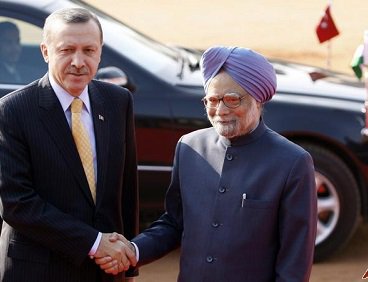
‘India’s Look East policy has started paying rich dividends,’ said Prime Minister Manmohan Singh earlier this year. ‘The policy has helped India strike strategic partnerships with many of the South East Asian nations in wide arrays like trade, investment, maritime etc. This has allowed us to explore opportunities and take the development process forward in even a better manner,’ he said.
The Look East policy might indeed be reaping great benefits, but there’s more in store for India. As India establishes itself as a significant strategic partner of South East Asia despite recent setbacks to the country's economy, it has caught the eye of many emerging economies of the West. One of them is Turkey.
India - Turkey relation dates back to the years of 1481 – 1482 when there had been the first exchange of diplomatic missions between Ottoman Sultan and the Muslim rulers of India. However in recent times, bilateral relations were formed only in the 1920s after India actively supported the Turkish War of Independence. Bilateral ties between the two countries remained tense over the last couple of decades due to Turkey’s closeness with Pakistan and it’s stand on Kashmir at international forums.
That is the past. But the present is different. And the future promises to be even more different.
Why is Turkey suddenly interested in India? The first reason is their status as a rising economy in the global platform. With a booming economy and a GDP of 1.073 trillion dollar, Turkey now boasts of being one of the fastest growing and steady economies and a highly favored investment destination. It recorded a staggering growth rate of 9.2 percent and 8.8 percent in 2010 and 2011 respectively although it did hit a road block in 2012. The country is among the world's leading producers of agricultural products, auto mobiles, ships and other transportation equipment. More particularly, Turkish Construction companies have enjoyed great reputation since long and continue to be one of the most favored construction companies all over the world. Boasting about the country’s growing status Prime Minister Recep Tayyip Erdogan said earlier this year that that the world was infatuated with Turkey's economy. ‘We are soon going to become one of the world's top 10’, he said proudly.
On the other hand, India too has risen by leaps and bounds in recent years. Recognized as one of the leading emerging economies of the world, India has attracted investments from all over the world especially since its liberalization policy of 1991. The rupee crisis and the outflow of some foreign investment in recent times coupled with less than satisfactory growth have cast a pall of gloom in India. But the fact remains that the last two decades have witnessed unprecedented development with the country recording a highest economic growth rate of up to 10 percent.
A collaboration between these two rising economies would result in mutual benefit and have the power to create ripple effect in not only Asia but across the continent. Bilateral trade in July 2012 stood at $ 7.5 billion with a target of doubling it by 2015. A developing India, which places high importance on infrastructure can benefit greatly out of Turkish construction companies, automobile and ship undertakings whereas Turkey can expect vital exports to India and investments from Indian MNCs as well as the government. Not surprisingly, recent bilateral visits have greatly focused on tapping these potentials and boosting economic co-operation.
The two countries' significant geo-political positioning and their role as regional power will also act a stimulus . Recognized as a contiguous transcontinental country, Turkey shares it border with eight countries and lies as a strategic connector between Asia and Europe. Not to forget, its proximity to the Middle East makes its geo political position even more significant. Given its crucial positioning and rising economy, Turkey is now being considered as an emerging regional power with great influence. Although a Muslim majority country, Turkey’s image as a progressive, liberal and secular state has led to it becoming the role model and highly favored global partner.
India, too, holds vital significance in terms of geo-politics. As a regional superpower and staking a claim for a permanent seat at the UN Security Council , India's influence has been growing not only in South Asia but the whole of Asia. It also acts a bridge between the South East Asia and the Middle East. Turkey’s growing interest in collaborating with India appears to be greatly influenced by this factor. Both India and Turkey can assist each other in forging better relations between their respective regions. Turkey’s interest is further fuelled by the fact that it has had a strained relationship with India's long-running rival China after the July 2009 Ürümqi riots, in which Turkey vocally criticized China for suppressing its own citizens. The criticism invited strong Chinese reaction. The hands of friendship and cooperation with India would thus seem strategically also judicious for Turkey.
Both countries realize the mutual benefits that they can accrue by boosting cooperation. This realization has grown in recent times. It in this context that President Pranab Mukherjee's impending visit to Turkey may be viewed. The Indian head of state is due in Ankara next month in the first visit of Turkey by an Indian President in 15 years. The visit is expected to unfold new modalities and avenues of partnership between the two countries to take the bilateral ties to a new height in accordance with the changed times and global and regional realities.
- Ukrainian Crisis And The World (Dis)Order
- Apr 22, 2022
- China’s Cautious Steps In The Graveyard Of Empires
- Aug 18, 2021
- Foreign Aid On The Fence!
- Aug 08, 2021
- Communist Party of China centenary celebrations Reading between the lips
- Jul 14, 2021
- Second Wave Of Covid-19 In India: Deadly Blow To The Economy
- Jun 23, 2021

















